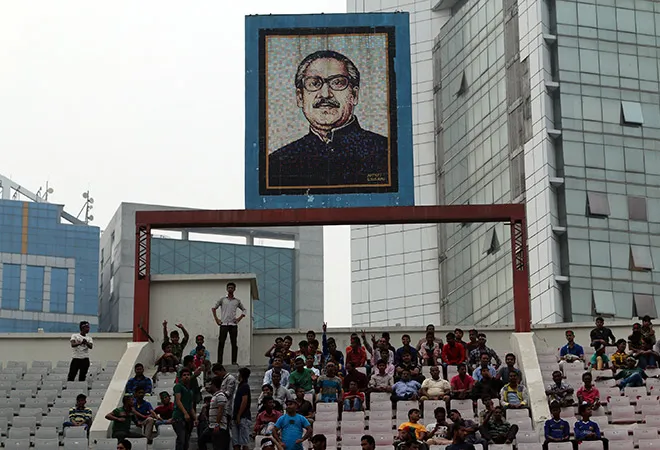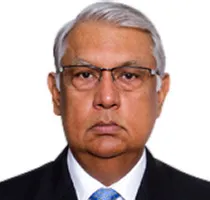-
CENTRES
Progammes & Centres
Location
The hunt for the rest of the killers of Bangabandhu will continue. India must give Sheikh Hasina unstinted support in this endeavour

On April 12, Abdul Majed, one of the assassins involved in the killings of Bangabandhu Sheikh Mujibur Rahman and his family was hanged in Dhaka. A former army captain, Majed was reportedly hiding in Kolkata. In 1998, a trial court had sentenced him and 11 others to death, and in 2009, the Bangladesh Supreme Court upheld the sentence. When his last recourse, the clemency plea to the president, failed, he was finally executed just after midnight.
In 2010, five others convicted of taking part in the assassination conspiracy were sent to the gallows. One among the twelve convicted, Major Aziz Pasha died in 2002 in Zimbabwe while in hiding. The rest five are still absconding. Bangladesh will not be able to achieve closure on Bangabandhu’s assassination until the five conspirators still alive are brought to justice.
When Majed was arrested last month, Bangladesh’s home minister hailed the development as the “biggest gift” for his country, which has had to postpone a year-long birth centenary celebration of Bangabandhu, on account of the coronavirus. Prime Minister Narendra Modi was scheduled to attend the celebrations.
Bangabandhu’s assassination changed the course of the country’s history. In 1977, soon after the assassination, the country came under the military dictatorship of General Ziaur Rahman, the then army chief, after he ousted President Khondoker Mostaq Ahmad. Zia was a reluctant “freedom fighter” and deserted the Pakistan army when he realised that Pakistan’s defeat was inevitable.
He, however, showed his true colours after the assassination of Bangabandhu. As soon as he grabbed power, he pardoned Bangabandhu’s assassins and rewarded them with diplomatic postings. He permitted leaders of organisations — such as the Jamaat-e-Islami (JeI) and the Razakars — that collaborated with the Pakistani army in the genocide to return. Sheikh Mujibur Rahman had banned these organisations, and declared them war criminals after Bangladesh’s war of liberation.
Zia passed an indemnity law in 1975, granting amnesty to those who were part of the assassination conspiracy (The indemnity law was revoked when Sheikh Hasina came to power in 1996). He also allowed many to form political parties and contest elections in the 1980s. He patronised pro-Pakistan politicians and organisations. With other politicians, he cobbled together the Bangladesh Nationalist Party (BNP), whose leadership was passed on to his widow, Khaleda Zia, after army personnel, in a coup attempt, assassinated him in 1981. Khaleda Zia, in coalition with Pakistani collaborator, JeI, served as the country’s prime minister for two terms. During her rule, Bangladesh-India ties had hit rock bottom.
Only two family members survived the assassination of Bangabandhu and his family: Sheikh Hasina, the incumbent prime minister, and her younger sister Sheikh Rehana, who were in Germany on August 15, 1975, the day the killings took place.
As prime minister, Sheikh Hasina has shown remarkable determination and tenacity in pursuing the killers. In 2008, she included the issue of the war crimes tribunal in her manifesto. She persisted despite domestic and international criticism, and the tribunal eventually completed the job entrusted to it. Several assassins and JeI leaders were convicted and hanged.
Sheikh Hasina has always believed that Zia was a party to the assassination conspiracy and played a key role in it. This fact is at the core of the bitterness and rivalry between her and Khaleda Zia.
Intelligence sources point to the role of Zia and his army colleagues in the assassination conspiracy, which was encouraged and financed by Pakistani generals and the Inter-Services Intelligence, smarting from their defeat and humiliation in the 1971 war. Zia, trained under the Pakistani army, had imbibed its ethos and instincts. Military coups were part of its DNA. This led Zia to anchor the country’s nationalism in Islamic and anti-Indian terms, as opposed to the secular values of the War of Liberation, espoused by Bangabandhu and his colleagues in the Awami League. General Hussein Muhammad Ershad, Zia’s successor as the army chief, who later served as the president of the country, amended the Constitution to make Islam the State religion of Bangladesh.
Majed’s arrest led to speculation over the reasons and circumstances under which he returned to Bangladesh. He may have been located and identified by India’s intelligence agencies and handed over to Bangladesh. Earlier, the agencies had launched a failed manhunt to find Risaldar Muslehuddin, another assassin, who was also reportedly hiding in India.
The hunt for the killers will continue. Intelligence cooperation between the two countries has improved during Sheikh Hasina’s regime. She will not give up on bringing the assassins to justice. India must give her unstinted support in this endeavour.
This commentary originally appeared in Hindustan Times.
The views expressed above belong to the author(s). ORF research and analyses now available on Telegram! Click here to access our curated content — blogs, longforms and interviews.

Pinak Chakravarty was a Visiting Fellow with ORF's Regional Studies Initiative where he oversees the West Asia Initiative Bangladesh and selected ASEAN-related issues. He joined ...
Read More +